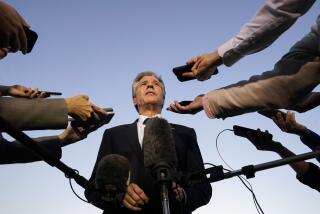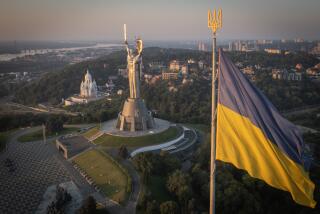Arab Summit Abruptly Falls Apart Over Regional Strife
- Share via
TUNIS, Tunisia — The government late Saturday night abruptly called off a summit of the Arab League even as leaders poured into this seaside city, a last-minute cancellation that threw in stark relief the acrimony roiling the region.
The collapse of the summit, which had been scheduled to begin here Monday, suggested that tenuous Arab unity has crumbled under the pressure of the Palestinian uprising, the war on Iraq led by the United States and demands for sweeping reforms of repressive and corrupt Arab governments.
The tension among Arab leaders seemed to reach critical mass with last’s week assassination of Sheik Ahmed Yassin, the founder and spiritual leader of the militant Palestinian group Hamas. The death of the charismatic cleric stoked Muslim anger against Israel, drew thousands of Arab demonstrators into the streets and emphasized the failure of Arab governments to intervene on behalf of the Palestinians.
The strike on Yassin came as Arab presidents and princes were preparing to discuss a Saudi peace plan to normalize relations between Israel and the Arab states in exchange for Israel’s withdrawal to its pre-1967 borders. When Yassin was killed after dawn prayers Monday at a Gaza City mosque, Arab demonstrators called on their governments to cut ties with the United States.
“It made it very difficult to talk about peace,” a Saudi official said.
Even before Yassin’s death, Arab leaders had struggled to find common ground in a year of deeply divisive events. The war in Iraq left many leaders feeling vulnerable to interference from the United States and to the long-repressed fury of their own people. There has been a general consensus on the need to modernize and liberalize Arab governments, but intense bickering over how to do so.
Signs of disintegration were evident in the days leading up to the summit: Saudi Arabia’s Crown Prince Abdullah and the top members of Bahrain’s ruling family decided to skip the trip to Tunis. Soon the heads of Oman and the United Arab Emirates followed suit. Syria remained staunchly opposed to any peace talks with Israel and to bowing to U.S. pressures on reform.
Egypt, Jordan, Yemen, Qatar and Tunisia had presented their own papers on reform, and Arab leaders had reportedly squabbled during summit preparations over whose reform model to adopt. After Yassin’s death, Gamal Mubarak, the son of Egyptian President Hosni Mubarak, laid out Egypt’s position in a rare speech to diplomats and journalists: There could be no reform, he said, as long as the Israeli-Palestinian fighting dragged on.
Near midnight Saturday, a spokesman for Tunisia’s Foreign Ministry appeared on live television and read a statement canceling the summit.
“It became clear that there was a variance of positions on ... proposals related to fundamental issues on modernization, democratic reform, human rights and the rights of women,” the statement said.
“Tunisia strongly regrets the postponement of this summit on which Arab and international opinion has pinned great hopes, considering the delicate situation through which the Arab nation is going and the deadlock of the Palestinian issue after the recent tragic events.”
In recent years, even during the bloodiest moments of the Palestinian uprising and on the eve of the U.S.-led invasion of Iraq, the Arab presidents and princes have managed to muster enough cohesion to, at the very least, quarrel their way through the annual summit.
But after Yassin’s death, newly angered demonstrators said Islam itself was under attack. Arab leaders were sensitive to the political pressures from their people, and leery of drawing public anger by extending a peace gesture to Israel. But they were also loath to draw U.S. anger by officially declaring the end of the peace process.
In the end, they chose to stay silent.
More to Read
Sign up for Essential California
The most important California stories and recommendations in your inbox every morning.
You may occasionally receive promotional content from the Los Angeles Times.












